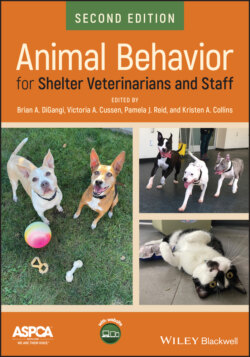Читать книгу Animal Behavior for Shelter Veterinarians and Staff - Группа авторов - Страница 62
2.5.2.4 Juvenile (Seven Weeks–Sexual Maturity)
ОглавлениеSocialization with humans may continue to improve into the juvenile period, provided the kitten received some handling from humans in the preceding weeks (Lowe and Bradshaw 2001; McCune 1995). This is assumed to be the case with intercat socialization as well (Bateson 2014).
Rapid physical development allows the kitten to become fully independent from the mother during this period. Kittens have well‐developed senses, thermoregulation, movement, and detection of danger by this stage. The weaning process is completed during the juvenile stage, and kittens are fully functioning predators by the early part of the juvenile period. The mother cat initiates weaning by bringing dead prey to the kittens around four weeks of age. As the kittens become more successful at killing prey, she later releases increasingly more mobile prey items near the kittens. Kittens continue to initiate suckling, but the queen gradually decreases the duration of nursing bouts to keep the kittens hungry enough to encourage exploration and hunting behavior. As their motor skills develop, the kittens also follow the dam on hunting trips. Eventually the dam only allows short suckling bouts, presumably for bonding purposes, and weaning of the kittens is usually complete by seven weeks (Bateson 2014).
Weaning age appears to have broader impacts on social and abnormal oral behaviors according to a recent survey study (Ahola et al. 2017). Owners of cats weaned before 8 weeks of age were more likely to report behavior problems than owners of cats weaned in the 12–15‐week range. Kittens weaned before 8 weeks were more likely to show aggressive behaviors than those weaned later. Later weaning was a protective factor against aggression toward other cats as well as familiar and unfamiliar people. The prevalence of abnormal oral behaviors like excessive grooming and wool sucking as well as shyness toward novel objects decreased in the kittens weaned after 14 weeks as well (Ahola et al. 2017; Houpt 2018). Overall, owners of cats weaned before 8 weeks of age were more likely to report behavior problems than those weaned in the 12–13‐week range. Aggression, abnormal oral behaviors, and shyness toward novel objects were shown to be inversely correlated to the age of weaning as well (Ahola et al. 2017).
